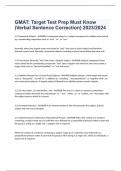GMAT: Target Test Prep Must Know
(Verbal Sentence Correction) 2023/2024
2.9 Compound Subjects - ANSWER-A compound subject is a subject composed of multiple nouns joined
by a coordinating conjunction such as "and", "or", or "nor."
Normally, when two singular nouns are joined by "and," they form a plural subject and therefore
demand a plural verb. Normally, compound subjects consisting of plural nouns follow the same rule.
2.10 Two Nouns Joined By "And" May Form a Singular Subject - ANSWER-Subjects composed of two
nouns joined by the coordinating conjunction "and" take a singular verb when the two nouns name a
single entity such as "bed and breakfast", or "rice and beans."
2.11 Additive Phrases Don't Create Plural Subjects - ANSWER-Additive phrases, which begin with words
such as "along with", "as well as", in addition to, "including", "accompanied by", or "together with", do
not create plural subjects. A singular subject followed by an additive phrase remains singular.
2.12 Or, Nor, Either...Or, And Neither...Nor - ANSWER-The verb in a clause or sentence containing a
compound subject joined by the conjunctions "or," "nor," "either...or," or "neither...nor" must agree with
the subject noun to which it is closest.
2.13 Inverted Sentences - ANSWER-In an inverted sentence, the verb precedes the subject, but the
subject and verb must still agree.
2.15 Collective Nouns Followed by Prepositional Phrases - ANSWER-When the context of a sentence
containing a subject made up of a collective noun followed by a prepositional phrases makes it clear that
the group is acting as a single unit, a singular verb is required.
When the context of a sentence containing a subject made up of a collective noun followed by a
prepositional phrases makes it clear that the group is NOT acting as a single unit, rather as individuals, a
plural verb is required.
, 2.16 The Collective Nouns "Majority" and "Minority" - ANSWER-Like other collective nouns that we have
discussed, the collective nouns "majority" and "minority" can be considered singular or plural depending
on the contexts in which they appear. Also, like other collective nouns, "majority" and "minority" can be
used alone or combined with prepositional phrases.
2.18 Subjects with Certain Preceding Elements - ANSWER-When a subject begins with the word(s)
"every," "each," "many a," or "many an," the subject always takes a singular verb.
2.21 Singular Indefinite Pronouns - ANSWER-Singular indefinite pronouns always take singular verbs.
These pronouns are:
"anybody," "anyone," "anything"
"each," "*either," "everybody," "everyone," "everything,"
"neither¹," "nobody," "no one," "nothing"
"one," "somebody," "someone," "something," and "whoever²"
* and ¹: Note that, when "either" is used in an "either...or" construction, we must follow the rules
concerning "either...or" The same applies to "neither" in a "neither...nor" construction --> as in, it must
agree with the subject to which it is closest.
²: Note that, when "whoever" precedes a plural noun, as in, for example "whoever the owners," the
plural noun may be the subject and take a plural verb, as in: Whoever the owners are, they are doing a
great job of preserving the wetlands on the property.
2.22 Plural Indefinite Prounouns - ANSWER-A plural indefinite pronoun always takes a plural verb. These
pronouns include: "both," "few," "many," and "several."
2.23 Other Indefinite Pronouns--Sometimes Singular, Sometimes Plural - ANSWER-The SANAMM
indefinite pronouns, "some," "any," "none," "all," "more," and "most," can be singular or plural
depending on their referents.
When a subject begins with one of these indefinite pronouns, we can't ignore the prepositional phrase
that comes between the subject and the verb.
2.24 Subject-Verb Agreement Involving The Word "Number" - ANSWER-Subjects that begin with "THE
number of" take singular verbs.




